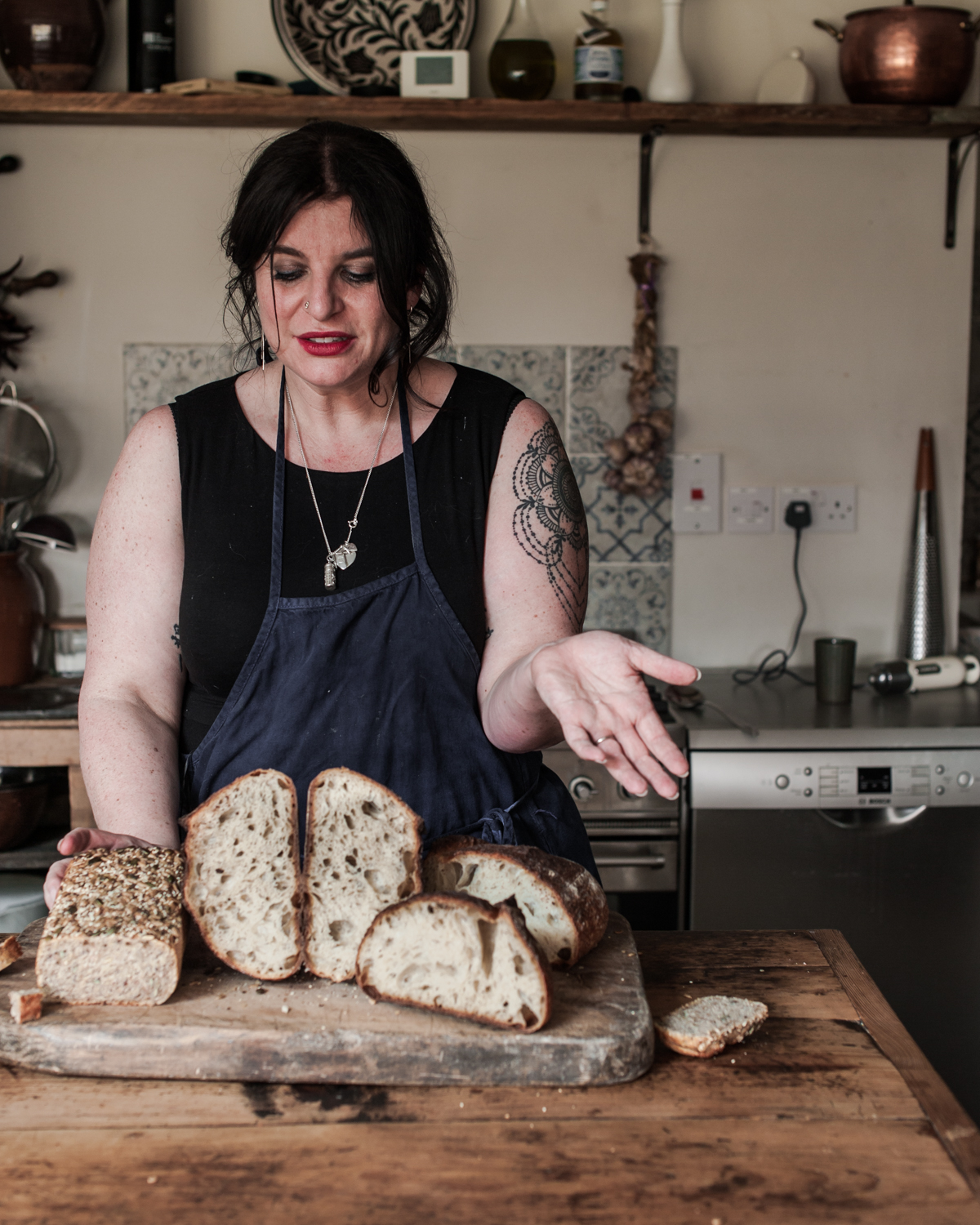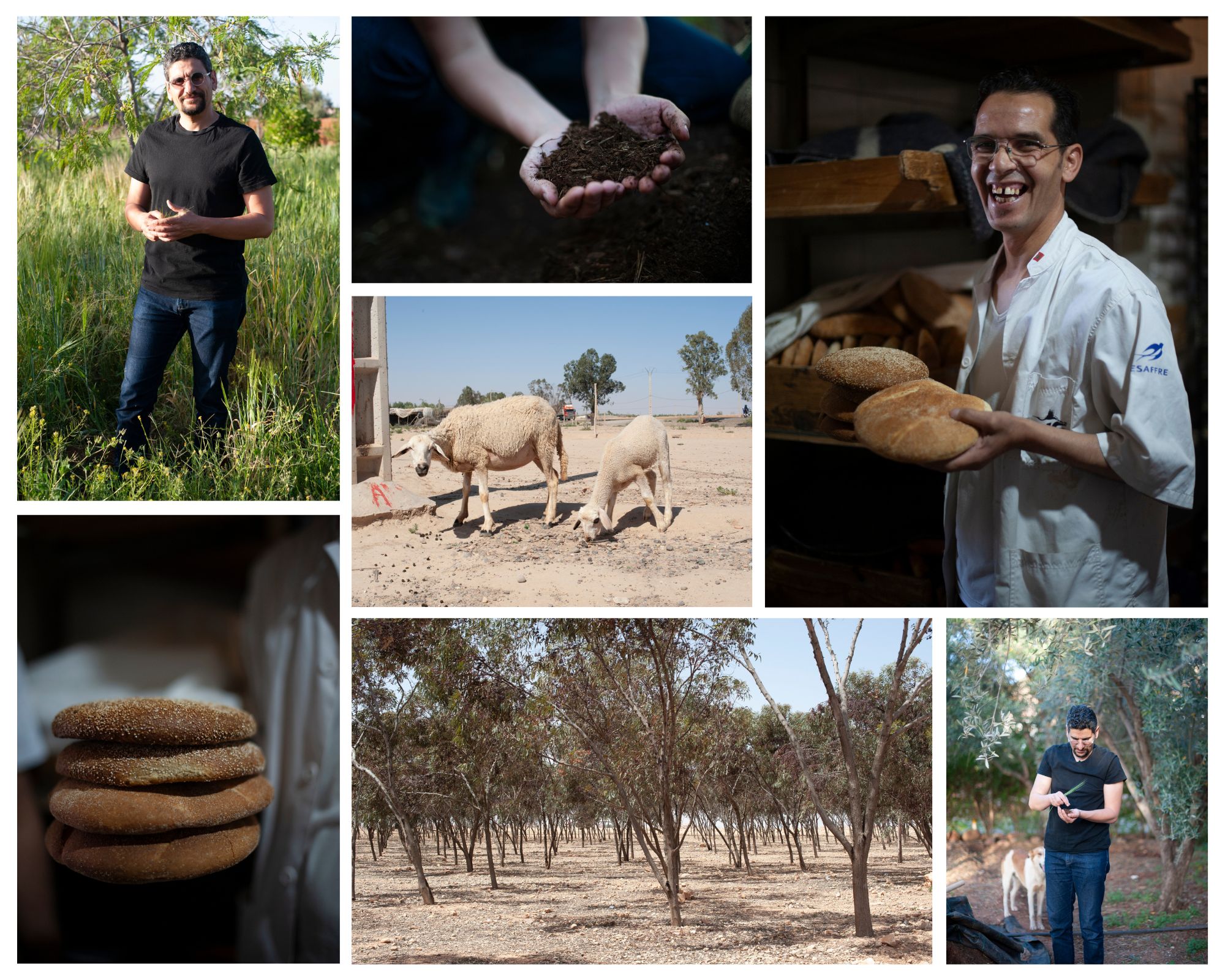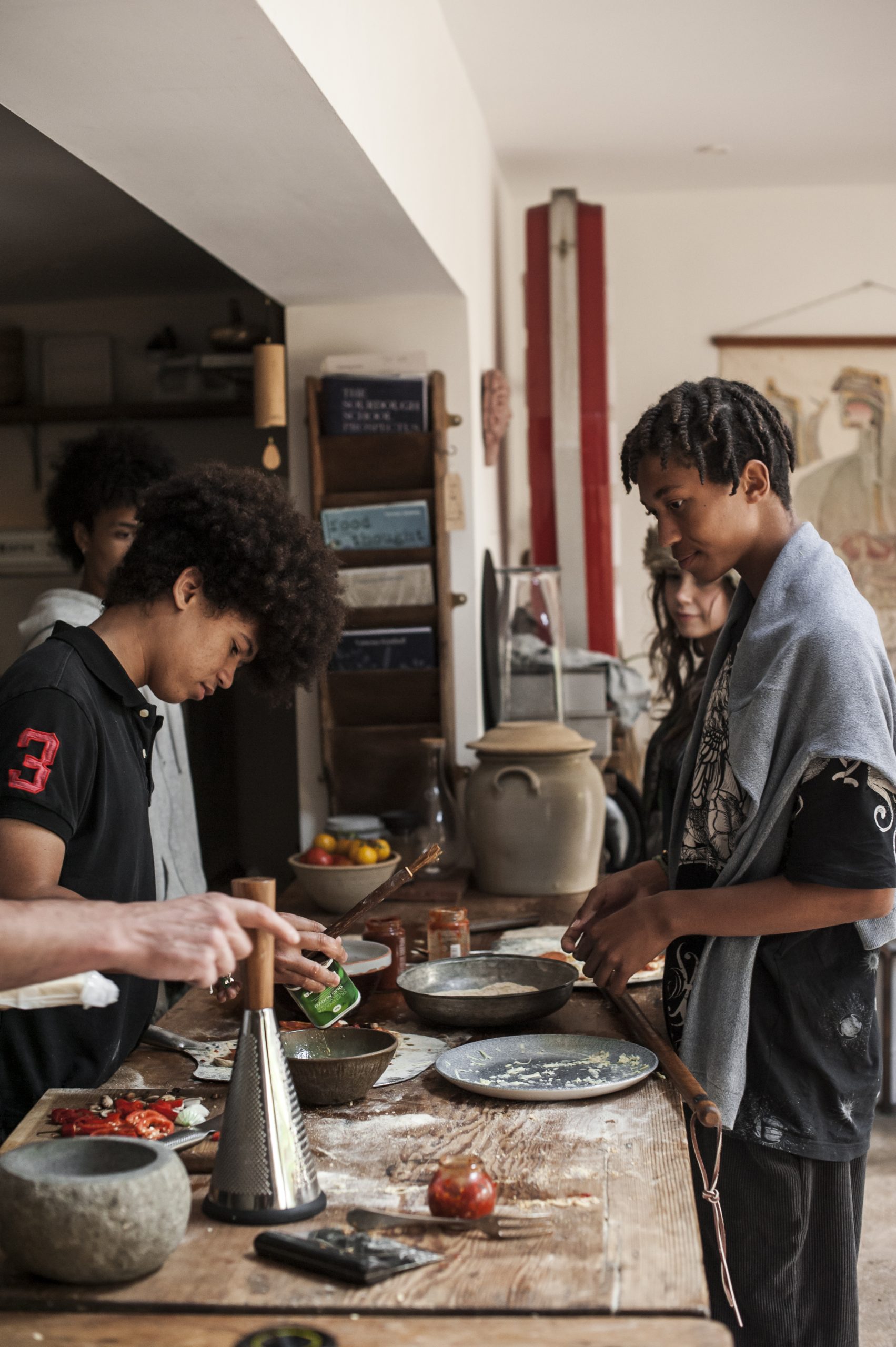Leading the way in gut health, mental health and bread
Bakers, multinational corporations and healthcare professionals around the world rely on Vanessa’s expertise. Long before gut health became a mainstream concern, Vanessa identified the crucial role bread plays in the gut microbiome and mental well-being. She recognised that poorly made bread can harm the gut and negatively affect mental health, while well-made, nutritionally diverse bread can play a part in improving both. Her influence has revolutionised people’s understanding of bread as a fundamental component of good health.
“Vanessa’s work on sourdough and the gut microbiome is changing the way we think of food, health and baking.” — Professor Tim Spector
Vanessa’s mission is to make nourishing bread a reality for all. Through her books and other writings, Vanessa shares her knowledge and techniques and heads up the Sourdough School as a Social Enterprise that motivates change through a self-funding Systems Change Programme.
Instigator of Systems change in Bread
Vanessa’s work extends far beyond the Sourdough School classroom. Recognised as one of the world’s foremost authorities on bread, she has taught thousands of bakers globally, from Hollywood A-listers and politicians to royalty, alongside hundreds of bakers who have gone on to bake, teach and open their own successful bakeries. Her expertise draws on years of interdisciplinary research, connecting bread to gut health, nutrition and mental well-being. Vanessa has created a roadmap to improve bread with the BALM (Baking as Lifestyle Medicine) protocol, which is now being integrated into the NHS and health-focused baking practices worldwide.
Vanessa is working behind the scenes to transform industrial bread. Over the years, Vanessa has hosted dozens of industrial bread makers and millers at The Sourdough School, advising the bread-making industry on sourdough fermentation, grain diversity and gut health. She has guided and encouraged key sourdough manufacturers in the UK to use real fermentation, increase fibre and diversity to improve bread, and make sourdough affordable.
As a result, her influence can now be found on supermarket shelves in the UK, as industrial manufacturers now offer bread made with sourdough fermentation processes and more diverse grains, seeds and fibre in their breads. This shift reflects Vanessa’s vision of bread as a key to nourishment and health, backed by her pioneering research into the gut microbiome and nutritional psychiatry.

1983 Vanessa is asleep after working in the village bakery at age 11, 1990 Vanessa at age 18 reading after a shift during her apprenticeship. 2015 Vanessa with The master baker in Terrason who oversaw her work at the bakery in 1991. 2017 Vanessa with world-renowned bakers Richard Hart and Gabrielle Bonci & working in San Fransisco 2018 Teaching in 2023 at The Sourdough School
Vanessa’s Story
Why is Vanessa’s approach to baking unique?
Vanessa understands that fibre, diversity and fermentation are key to healthy bread. She believes in using our senses to bake. She encourages her students to use touch, smell, sight, feel and taste as they bake, and in using a 6th sense: common sense. She also believes that we need to optimise our staple food for social equality.

Vanessa Kimbell is renowned for her transformative approach to sourdough baking, which combines nutritional science, personalised nutrition, and a deep understanding of the gut microbiome.
The BALM Protocol
At the heart of her work is the Baking as Lifestyle Medicine (BALM) Protocol. This evidence-based framework redefines bread as a health-promoting staple. By emphasising fibre-rich grains and long, slow fermentation, the BALM Protocol enhances nutrient bioavailability and supports gut health.
Personalised Nutrition
Kimbell integrates personalised nutrition into her practice, offering tailored bread-making workshops. These workshops consider individual genetic profiles, aligning bread recipes with unique health needs to maximise their nutritional benefits.
Holistic Bread Practices
Beyond baking techniques, Kimbell advocates for 'symbiotic eating' and 'sequenced eating' to further support gut health. Her methods empower both healthcare professionals and home bakers to use bread as a tool for lifestyle medicine, fostering systemic change towards healthier food systems.
Social and Environmental Impact
Through The Sourdough School, Kimbell teaches bakers from over 84 countries, promoting sustainable and equitable bread-making practices. Her work operates as a social enterprise, ensuring good bread is accessible to all while supporting social justice and environmental sustainability.
Bake, Eat, Share How Neurodiversity Shapes Vanessa Kimbell’s Holistic Approach to Bread and Well-Being
Vanessa teaches you not just how to make bread, but also how to eat bread. She examines each type of bread in relation to its social, cultural and agro-economical context, considering the traditions that determine how it is eaten. Vanessa is concerned by the loss of knowledge that comes with the increasing homogenisation of bread, warning us against the pitfalls of industrialisation; and even against books such as her own, which risk to standardising breads within the artisan bread community.

Vanessa uses photography (such as these taken in Morocco) as a means to share her knowledge and to develop a narrative that inspires people to realise the social, economic, and political effect of bread.
Her baking philosophy is focused on empowering people and fostering a sense of community. She believes in the transformative power of fermentation and sees baking nourishing bread as an act of social justice.
Vanessa's neurodivergence has undoubtedly influenced her approach to baking (Vanessa was diagnosed with both ADHD and Asperger's, now commonly referred to as ASD). Aspects of neurodiversity, including monotropism — an intense focus on specific interests — have shaped her perspective and contributed to her distinctive approach to bread.
Vanessa’s apprenticeship and professional training is key to her being a leading figure in bread and health innovation

Vanessa's academic work requires a theoretical understanding of bread and research involving deep investigation into nutrition, the gut microbiome and the science of fermentation. This contrasts with hands-on artisan baking, which requires years of practical experience, intuition and craftsmanship.
Vanessa bridges these two worlds, merging rigorous scientific knowledge with the tactile, creative process of baking. This rare combination is what allows her to understand both the biochemical and cultural significance of bread, giving her a distinctive perspective on bread as a whole.
Vanessa spent two years at college in the UK and then a year in Southwest France training as professional sourdough baker, after which she returned to the UK to work as a baker. Over the years she has visited bakeries worldwide, including well known establishments such as Tartine, Bonci's, Della Fattoria and Noma. Working alongside many other bakers and millers ensures Vanessa's technical knowledge and baking abilities are exceptional.
However, it is Vanessa's activism that has garnered a significant following. With an audience of over 500,000 on her social media channels, people respond to her passionate commitment to her cause: bread as a basic human right.
She advocates against the majority of the daily bread consumed by the population, highlighting its detrimental impact on health and the environment.
The BALM protocol was developed with the aim of empowering others to address the disconnect between current bread practices and the findings of available research. Vanessa asserts that the ultra-processed bread commonly purchased by the majority of people is so heavily processed and adulterated that a lifetime of consuming such bread is nearly as damaging as smoking. Her advocacy seeks to raise awareness about the need for change in our approach to bread, arguing for healthier and more sustainable alternatives.
Prescribing Baking, Social Equality and Social Enterprise
Vanessa developed the Baking as Lifestyle Medicine (BALM) Protocol over two decades. It is an evidence-based protocol that lays out the rules governing every level of the bread making process, including baking, eating, and sharing bread and baked goods. It provides a path towards social and political change in the way we approach bread and baked goods, optimising our staple food for social equality. With her extensive understanding of fermentation and the gut microbiome, Vanessa has trailblazed a healthier approach to bread through sourdough culminating in articles on bread, the gut microbiome, and bread and nutrition, along with her books, social media and publicity. She teaches healthcare professionals how to prescribe Baking as Lifestyle Medicine to patients as a social prescriptionalongside her teaching as the course director here at the Sourdough School. In essence, she is an activist whose work to change the way we bake and eat our bread is motivated by the belief that life is precious; our everyday food should not be making us ill, but nourishing us, to live the best life possible.
"You will never ever meet anyone else in the whole world who's more knowledgeable about bread and the gut microbiome, or indeed more passionate about sourdough bread." - Dr. Miguel Mateas
How Vanessa's approach and influence over the years has inspired and supported thousands of bakers
In the video below, Emmanuel Hadjiandreou explains how Vanessa has inspired and supported thousands of bakers through her social enterprise. Friend, master baker, author and renowned teacher, Emmanual gives an overview of Vanessa from a baker's perspective. She has changed the way the world understands bread and made bakers across the world question the status quo.
Vanessa has been baking Sourdough since 1983
It may come as a suprise that Vanessa has been baking with sourdough for over four decades, but she began as a little girl in south west France.

Over forty years ago, a young Vanessa fell head over heels in love with the bread she was served in the local village restaurant in the Dordogne. This simple passion led her to train as a baker; but it was when she stopped being able to digest industrial bread that she embarked on a lifetime of research to discover why, on the other hand, she could digest sourdough. The Sourdough School as we know it today leads the way in the application of the most up to date research to bread making.
When Vanessa was nine, her parents bought a house in rural south-west France. Vanessa's Italian mother loved good food and was a senior chef at Keele University. Both her English grandmother and Italian great-grandmother were bakers, and the house she now lived in was just 60 yards away from the thriving rural French village bakery. The bakery supplied all the bread for miles around and was right the heart of the community. This little girl fell in love with everything French – the wine, the cheese, the fresh fruit and vegetables, the farmers, and the local markets. But most of all she fell in love with the bread. She didn’t even know the word for bread in French, but she fell instantly in love. “I made a connection that will last as long as I breathe.” She bought bread every day and learned a new word each time until she had enough words to ask if she could stay and watch. Every morning at 3 am she would creep down two flights of ancient wooden stairs, climb out of the window and run down the alleyway in the pitch black to the bakery.
Vanessa is an enthusiast, a delighter in life’s most civilised pleasure, and a grown-up who’s retained a child-like wonder at the mysteries of the world.’
–Sheila Dillon BBC Radio 4 Food Programme
She ran as fast as her legs could because only the light of the moon lit the way, but her love of the bakery was stronger than her fear of the dark. As she ran into the square, the bakery oven was lit. The air was cool and filled with the smell of oak burning, and she never slowed down until she was right inside the bakery. The bell on the door would ring furiously as she knew once she was inside the warm brightly lit bakery she was safe. As the years rolled on nothing changed. Every holiday, at every chance, she’d work on the bakery. Sweeping the floors, serving the customers, cleaning and helping to make the bread, she spent every spare moment there. It was in this rural community that she really connected to farmers and the land, and to the relationship between food and family and community that was right at the heart of French living. Aged 18, she qualified as a baker and a chef in the UK, but there were no ‘real’ bakeries.
Apprenticeship in France
In 1992 returning to France, she worked in a restaurant in Paris for a summer and then as an apprentice baker in the Dordogne. Returning to the UK, Vanessa worked as a baker and chef in a hotel in Leicester whilst at university and completed a degree in Psychology of Human Communication. It was whilst finishing her degree in 1995 that she became poorly, and was given a strong dose of antibiotics called Metronidazole. It was one of a long list of antibiotics that destroyed her gut microbiome and, to her utter dismay, she stopped being able to tolerate wheat. It made her ill and she had no option other than to stop being a baker. She gave up the thing she loved most.
She gave up the thing she loved most - bread and baking.
For over 4 years she avoided all wheat until she returned to the bakery and was given some warm bread by her friend. Unable to resist, Vanessa ate the bread and discovered that she could digest sourdough without issues. When she returned home she ate ordinary commercial bread and was poorly again. This was a pivotal moment and she set out to try and understand why. The doctors she spoke to didn't have answers; neither did the nutritionists or bakers. She was told she had a leaky gut and so this set a new path: to understand the role of fermentation and how the long slow fermentation eased the digestion of bread.
The missing piece of the puzzle
In 2016 as part of researching into the microbes in her sourdough starter, she discovered through tests by Tim Spector that she had an extremely low microbial diversity. The results showed a microbiome that was disturbingly unhealthy, with less then 1% diversity, despite Vanessa's diet being diverse and fibre-rich. Vanessa's gut microbial diversity was comparable to, if not worse than those found in autistic children. She was left with 69% Bacteroidetes and 29% Firmicutes, both microbes associated with obesity
Medical records showed Vanessa had been prescribed 57 lots of antibiotics
Getting hold of her medical records, she asked Dr Alison Coleville to list the antibiotics she had taken in her lifetime. As she read the results she burst into tears. Over her lifetime she had been prescribed a total of 57 Antibiotics, her first being administered when she was just 6 months old. Total antibiotic counts:
- Amoxicillin x 27
- Penicillin V x 11
- Erythromycin x 3
- Co-amoxiclav x 2
- Metronidazole x 1
- Cefalexin x 5
- Flucloxicillin x 5
- Doxycycline x 1
- Trimethoprim x 2
The timeline of Vanessa’s reaction to wheat tied in exactly with a strong dose of Metronidazole. This pot of tablets changed everything. Studies have now shown that antibiotic-induced dysbiosis is likely to influence numerous immune and metabolic outcomes through routes that affect the intestinal milieu’s overall inflammatory tone. In this regard, microbiota alterations can result in a decrease of IgA, a non-inflammatory immunoglobulin involved in pathogen and allergen exclusion (Rautava et al., 2004; Penders et al., 2007a; Cerutti and Rescigno, 2008). In addition, metronidazole has been shown to cause a decrease in the expression of Muc2, the major component of the mucin layer (Wlodarska et al., 2011); thinning of this layer would result in a more direct contact between gut microbiota and epithelium, with likely increases in innate immune stimulation and inflammation In Vanessa’s case it was likely the cause of her reaction to wheat and many other foods that were to follow. To make matters worse a nutritional therapist put her on a restriction diet to try and identify the offending foods. We now know that diversity of food is the key to nurturing microbes but for over a year, Vanessa was restricted to just a handful of ingredients, which contributed to the extinction of her microbes. The restriction continued for almost 5 years with multiple food allergies and intolerances.
Teaching The Doctors Baking as Lifestyle Medicine
Over twenty years on, Vanessa is internationally renowned for her passion and unique understanding of long slow fermentation. In many ways she came full circle, teaching the nutrition and digestibility of bread course to doctors and health care practitioners, accredited by the Royal College of General Practitioners. In 2009 she wrote her first book Prepped, and her next book Food for Thought won the World Book Awards for Most Ethical and Sustainable Book. It was also The Telegraph Book of the month. Her 3rd book, The Sourdough School, is a best seller on the subject of how to make nutritious and delicious sourdough. It was hailed as "the most important book of the year," in 2019 by Waitrose Magazine. Next came Sweet Sourdough in 2020, and The 10 MInute Loaf in 2022 completed The Sourdough School trilogy. Vanessa is currently writing her 6th book which will be published in 2025.
Optimising our staple food for social equality
Once Vanessa realised that fermenting flour and water transformed it into bread that was not just delicious but digestible, she found herself on a mission to understand how and why sourdough is easily tolerated by people with digestive issues and why is it so important to eat bread that is nutritious. "Feeling poorly changes everything. It changes the way you feel. I realised that when I ate long slow fermented bread created from the flour blends that I mill, along with other fermented wholefoods, I felt better. Not just physically but mentally. As I began to teach, it became obvious that the kind of bread people eat every day was integral to health and my focus stopped being about me. I do not think you can underestimate the importance of the way we approach bread, and the impact on health, given that wheat makes up between 20-30 (depending on socio-economics) of calories consumed by humans. My life’s work is about understanding and sharing knowledge of how to make bread that nourishes. It has meant redefining our approach to flour and combining this with fermentation. Fermentation alone is not enough to change the paradigm of bread. It is a combination of the way we grow our grain, the diversity of the ingredients we use to mill our flour, the way we ferment our bread and the way we eat our bread that supports our health and our immune system. At the heart of my work is the belief that the transformation of flour and water into food that nourishes us impacts both our gut microbiome and our mental health. This is bread that nourishes and from this base we can bake, eat and share bread as lifestyle medicine."

